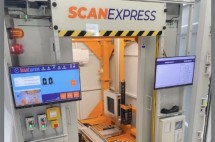Five Reasons to Reevaluate Your Endpoint Protection
By : Oleg Mogilevsky | Tuesday, November 10 2020 - 11:00 IWST

Oleg Mogilevsky - Product Marketing Manager at Check Point Software Technologies (Photo by Linkedin)
INDUSTRY.co.id - The last few months have changed the way we work. With the instant shift to a fully remote or hybrid workforce, protecting endpoints became a major pain point for many security leaders. Surges in using personal devices to access corporate infrastructure and sensitive data have instantly expanded the attack surface. Cybercriminals are taking advantage of these security gaps in order to gain entrance to enterprise resources.
With the new emerging threats caused by remote working standards, security professionals need to reevaluate their approach to protecting endpoints. In order to do so, it’s vital that organisations recognise their existing challenges.
1. Ransomware is on the rise
Ransomware attacks that are aimed to seize control, halt business operations or threaten public release of sensitive data are growing in scale and intensity. According to Check Point Research, he United States saw a doubling of ransomware attacks over the last three months. Claiming a new victim every 10 seconds, ransomware is a lucrative attack method for cybercriminals.
In some cases, organisations simply prefer to pay the price instead of dealing with encrypted files and recovering their IT systems. This creates a vicious cycle – the more these type of attacks “succeed” the more frequently they occur.
2. Visibility compromised
With the advent of remote work in the wake of COVID-19, swift registering and further monitoring of every new device is beyond challenging. Any unmonitored device becomes a potential entry point for malicious lateral movements through the network, planting sophisticated malware, or executing abovementioned ransomware attacks.
Obtaining complete real-time visibility is essential, as it is a significant enabler in allowing security teams to prevent threats with no grey zones in the infrastructure.
3. Noise and disruption are no longer acceptable
As attacks scale and evolve, the inability to have an informed judgment on the risk and threat criticality is a recipe for disaster. Simultaneous and often unverified alerts coming from various solutions may paralyse your security teams’ performance at the time when swift action is crucial.
Only endpoint solutions with multiple levels of analysis, AI-driven predictive capabilities and real-time access to global intelligence feeds can quickly verify, analyse, provide context and prioritise alerts in order to focus on those that really matter.
4. Incautious behaviour of your employees
Newly created gaps in the IT systems, along with the widening range of malicious COVID-19-themed messages, attachments, and documents became the immediate evidence to how damaging employees’ lack of awareness is.
Understanding and preventing these risks along with gradual user education and knowledge sharing – can be a solution. The issue is – it takes time and security leaders have none, aiming to retain complete protection and fulfil a compliance mandate.
5. Conventional approach doesn’t cut it
IDC’s latest “IT Endpoint Security Survey” results[1] indicate that only in 30% of cases, security leaders name endpoint device security as a significant component for the organisation’s overall cybersecurity strategy. Another research by Ponemon[2] stated that 51% of respondents said their organisations’ endpoint security solutions are not effective at detecting advanced attacks.
In other words, overlooking endpoint security nor taking an immediate, tactical approach no longer works. Taking a fresh, strategic look at protecting your endpoints and remote workforce will help stay ahead of potential incidents and minimise any potential impact.
What now?
The answer is quite clear: “Hope for the best, and prepare for the worst”. Security leaders are recognising the challenge they face. It’s now time to understand how to reevaluate your endpoint security to have all critical capabilities in place while lowering the TCO.
Read Also
Marketing in Motion: Behind the Promotion Strategy Jakarta-Bandung…
Rare Earth Minerals Finds in India Likely to Inform Future Lithium…
Take the pressure off coding for your developers
What is International Marketing? How did Start-Up Company Implement…
Five Applicable Marketing Tactics for Startup Company
Today's Industry

Jumat, 02 Mei 2025 - 10:46 WIB
Binawan and Government Support Indonesian Nurses in Europe through Scholarships
In the midst of the viral #KaburAjaDulu hashtag as a symbol of the young generation's disappointment with domestic working conditions, Binawan responded with real action: dispatching Indonesian…

Jumat, 28 Maret 2025 - 22:21 WIB
SUNeVision Initiates MEGA IDC Phase Two Development
SUNeVision, the technology arm of Sun Hung Kai Properties (SHKP), today announced the commencement of construction for Phase Two of MEGA IDC in Tseung Kwan O. As Hong Kong's largest data centre…

Jumat, 28 Maret 2025 - 22:07 WIB
TDL Records New Revenue Record of IDR 25 Trillion in 2024 Ahead of 50th Anniversary
PT Metrodata Electronics Tbk (MTDL), the largest technology Company with the most complete IT and telecommunications products in Indonesia, managed to record a revenue of IDR 25 trillion in…

Jumat, 28 Maret 2025 - 22:00 WIB
Wireless Logic Selected By Thales As IoT Connectivity Partner
Wireless Logic, a global leader in IoT connectivity solutions has been selected by Thales, a global leader in advanced eSIM technologies, to enable secure, scalable and resilient IoT connectivity…

Jumat, 28 Maret 2025 - 21:53 WIB
Microvista Expands International Presence with Mobile CT System ScanExpress
The German specialist in industrial computed tomography and non-destructive testing, Microvista, announces the European expansion of its innovative mobile CT system, ScanExpress. The system…

















News Comment